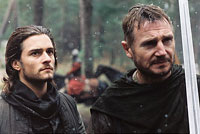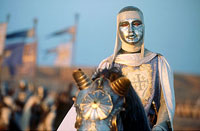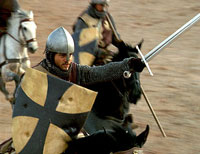 |
There have been surprisingly few films about the Crusades, and the handful that do exist have been ambivalent at best about the legacy of those wars.
Prior to Ridley Scott’s action epic Kingdom of Heaven, perhaps the biggest Hollywood production to date was Cecil B. DeMille’s The Crusades, a 1935 romance that condensed a century or two of history into a melodramatic but ultimately pious love triangle. The film opens on a sensationalistic note, as Muslims tear down crosses and sell Christian women into slavery, but concludes with a message of religious tolerance, as the arrogant King Richard sets aside his faith in the power of his sword in order to find peace and harmony with the Saracens. Gamal Abdel Nasser, the future president of Egypt, was so impressed with the film’s dignified portrayal of Saladin (or, in Arabic, Salah-ad-Din) that he let DeMille use the Egyptian army as extras in his 1956 remake of The Ten Commandments.

Beyond that, there have been one or two smaller films, as well as scattered references to the Crusades in films about Robin Hood and Ivanhoe, though the wars themselves are almost always kept well off-screen. One significant exception is the 1991 Kevin Costner vehicle Robin Hood: Prince of Thieves, a rather noisy and politically correct action flick that begins in a Jerusalem prison mainly so its title character can add a Muslim sidekick to his Merry Men, preaching the virtues of religious diversity.
So when Scott set out to make his own movie about this era (technically, it does not take place during the Crusades but, rather, between them) he was venturing into largely unexplored territory. And it is to his credit that the film is as nuanced and complex as it is.
Scott and his screenwriter, William Monahan, had been discussing this project before the “war on terror” began, and they are quite alert to the fact that their film comes out at a time of intense religious and political fervor. Thus, instead of settling for the pat messages of earlier films, they aim for a more complicated understanding of both the Christian and Muslim sides. Kingdom of Heaven focuses not only on the conflict between the opposing armies, but on the debates within both camps over what God’s will might be.
The film stakes out its own kind of neutrality by viewing these events through the eyes of Balian of Ibelin (Orlando Bloom), a French blacksmith who has been doubting his faith ever since his wife committed suicide, thus damning herself in the church’s eyes. As his wife’s corpse is laid to rest, a knight named Godfrey (Liam Neeson) visits Balian’s smithy, reveals that he is Balian’s father, and offers to take him to the Holy Land. Balian is reluctant at first, but when he sees that the local priest has not only beheaded his wife’s body but stolen her crucifix, he kills the man in a crime of passion. To atone for both his sin and his wife’s, Balian then catches up with Godfrey to go with him to Jerusalem.

Once there, though, Balian does not sense the divine forgiveness he had hoped for. Soon he finds himself embroiled in local politics. An uneasy truce exists between the Kurdish warrior Saladin (Ghassan Massoud) and Jerusalem’s King Baldwin IV (Edward Norton), a leper whose body and face are kept hidden behind robes, gloves, and masks. Muslims and Christians may practice their faiths openly for now, but Baldwin must contend with the fanatical, warmongering Knights Templar, and Saladin knows he can exploit this internal division. Eventually these tensions escalate into a full-fledged war, with Saladin laying siege to the Holy City, and Balian, as senior military officer, leading its defense.
On one level, Kingdom of Heaven does for history what Peter Jackson’s Lord of the Rings films did for Tolkien’s novels—it turns its source material into an exciting, action-oriented spectacle, yet manages to capture something of the spirit of the original events. An early fight scene between Godfrey’s men and some officers who have come to arrest Balian would be right at home in the macho B-movies of the 1980s; one musclebound warrior keeps right on fighting long after an arrow has pierced his throat and neck. In addition, the armies and trebuchets that surround Jerusalem during the final battle cannot help but bring to mind the assault on Minas Tirith in Return of the King, the finale in Jackson’s trilogy. Even so, Scott finds singular moments of breathtaking, menacing beauty; late at night, a string of fires comes to light on the dark, distant horizon, and it takes a moment to register that these are firebombs heading straight for the camera.
More importantly, the film raises provocative questions that, given their setting and theme, are reminiscent of more thoughtful epics like Lawrence of Arabia. Key among them is the relationship between God’s will and human agency—and whether the former can ever be discerned in the latter. Baldwin’s sister Sybilla (Eva Green) suggests the two faiths have fundamentally different sensibilities on this point when she remarks, “Their prophet says ‘submit.’ Jesus says ‘decide.'” But the question is debated within each faith, too.

Guy de Lusignan (Marton Csokas), a Templar who is married to Sybilla and is thus poised to sit on the throne himself, insists that God wants the Christians to slaughter the Muslim hordes. But Baldwin refuses to comply, even going so far as to hang knights who would pick fights with their putative enemies. Witnessing one of these executions, Balian remarks to a Hospitaller (David Thewlis), a member of the military-religious order entrusted with the care of unwell pilgrims, that this seems odd: “They are dying for doing what the pope would tell them to do.” The Hospitaller replies, “Yes, but not Christ, I think.”
Similarly, one of Saladin’s underlings chastises him for not pressing forward more boldly against the Christian armies; he insists that Saladin, by pursuing his more cunning strategy of waiting for Baldwin’s ranks to collapse from within, is failing to follow God’s will. To this, the Kurdish warrior replies by asking how many battles God had won for the Muslims before he (Saladin) came along—that is, before God determined that he should come along.
The film also emphasizes the need to take responsibility for one’s own actions in the midst of competing and conflicting forces. Baldwin proposes killing Guy and marrying Sybilla off to Balian, thus ensuring the city will remain in moderate hands. But Balian, despite his adulterous affair with Sybilla, refuses to be involved in a premeditated murder, even if it might preserve the peace. “It is a kingdom of conscience or nothing,” he says.

Ultimately, Balian must defend Jerusalem itself. And it is fascinating to see Bloom, who began his career as an elfin auxiliary in the Lord of the Rings films, grow into the sort of semi-kingly leading man who can rally the troops to the highest ideals of chivalry.
Kingdom of Heaven inevitably invites comparisons to Gladiator, Scott’s last major epic. But it is a better film, partly because it does less violence to the history, and partly because it rises above the simple-minded revenge-movie dynamics that grounded that earlier film. It also does a much better job of fitting its personal stories within their political context. Balian might never find the answers he is looking for; the film is decidedly doubtful about knowing God’s will. Still, stunning visuals and all, it does raise some questions that might prove useful in these interesting times.
Talk About It
Discussion starters- In the film, Guy de Lusignan says an army that marches behind the cross is invincible, even if it is outnumbered. In his book Warriors of God, James Reston Jr. says the Knights Templar were motivated by passages such as Joshua 23:10. But the fate of their army seems to bear a closer resemblance to 1 Samuel 4, in which the Israelites thought they could use the Ark of the Covenant to win a battle, and instead they lost badly to the Philistines. How can we know when we are stepping out in faith and following God’s will against all odds, or simply trying to use him to achieve our own ends? How do you tend to read Scripture—to justify decisions you have already made, or to search for God’s will? How do you determine God’s will when passages seem to point in opposite directions?
- Is it possible that it really was God’s will for the Muslims to conquer Jerusalem? Why might that be? Consider the prophecies of Habakkuk or Jeremiah, to whom God said he was sending the pagan Babylonian army as a punishment against Judah. Consider also Jesus’ prophecies about the coming Roman destruction of Jerusalem (e.g. Luke 21:20ff; 23:27ff). Do you think God is still at work in world affairs like this? If he wills that one army should defeat another, does it necessarily follow that he is on the winning army’s “side”?
- What is the relationship between personal responsibility and public involvement? Do you think Balian makes the right decisions? What would you have done differently?
- What, if anything, in your life is worth fighting for? Worth dying for? Why or why not?
The Family Corner
For parents to considerKingdom of Heaven is rated R for strong violence and epic warfare. There is plenty of blood and gore, and many wounds are inflicted to people’s throats and chins; one character’s leprosy is also hinted at somewhat graphically in a couple of scenes. There are hints of a sexual affair, but nothing graphic or prolonged.
Photos © Copyright 20th Century Fox
What Other Critics Are Saying
compiled by Jeffrey Overstreetfrom Film Forum, 05/12/05When Peter Jackson made The Lord of the Rings films, those battle scenes set a new standard for epic filmmaking. It was as though he threw down the gauntlet, challenging other great filmmakers to “top that.” And it seems Ridley Scott, director of this week’s box office champion, Kingdom of Heaven, took the challenge personally. In his latest, masterful period re-creation, Scott brings the late 12th century to life, and plunges us into the Muslim siege of Jerusalem during the early days of the Crusades.
Scott has succeeded in crafting a better film than Gladiator, his last major period piece. Kingdom of Heaven offers a much richer and more complex web of stories, and it glorifies a search for virtue and peace that involves something more admirable than a mere revenge quest. We follow the journeys of Balian (Orlando Bloom)—a blacksmith, a widower, and a murderer—in his search for redemption, led by his long-lost father Godfrey (Liam Neeson), who teaches him about the virtuous character of a knight. Together, they struggle against a violent, power-hungry Christian soldier (Martin Csokas) to keep the leprous King (Edward Norton, performing brilliantly behind a mask) on the right path as the Muslim warlord Saladin moves against Jerusalem. Purpose-driven, Balian finds himself rising to become a leader.
Kingdom of Heaven is a movie of and for our times, truly. Screenwriter William Monahan tries very hard to talk about a historical clash of Christians and Muslims without offending Christians or Muslims. He does this by portraying a wide variety of religious individuals on both sides of the conflict, and by focusing on sins of arrogance and brutality instead of errors in dogma. Nevertheless, he does seem to favor the path of the compassionate agnostic, making it seem as if the world would be better if men merely followed their hearts and abandoned any sense of allegiance to a higher power.
My full review is at Looking Closer.
In his review at Christianity Today Movies, Peter T. Chattaway writes, “Kingdom of Heaven does for history what Peter Jackson’s Lord of the Rings films did for Tolkien’s novels—it turns its source material into an exciting, action-oriented spectacle, yet manages to capture something of the spirit of the original events. More importantly, the film raises provocative questions that, given their setting and theme, are reminiscent of more thoughtful epics like Lawrence of Arabia. Key among them is the relationship between God’s will and human agency—and whether the former can ever be discerned in the latter.”
(In his personal blog, Chattaway also wonders if Christian critics bothered by the film’s portrayal of Christians were also bothered by films that caricatured other ethnic groups and cultures.)
Steven D. Greydanus (Decent Films) writes, “The story could largely be described as the failure of moderate Christians to restrain fanatical Christians from oppressing innocent Muslims, thereby provoking justifiable Muslim retaliation against the Christians, both fanatics and otherwise. Yet Saladin himself is not an uncomplicated noble figure. As he prepares to lay siege to Jerusalem, he explicitly rejects the possibility of showing mercy, relenting only when Balian fights him to a standstill. The film cross-examines the Christians in a way it doesn’t the Muslims.”
He concludes that it “leans toward the agnostic conclusion that the world might be better off if there were no temple wall, no mosque, no sepulchre for Christians, Jews, and Muslims to fight over. Alas, the sad history of religious strife in, over and around the Holy Land makes it difficult to fault the filmmakers for finding this a tempting point of view.”
David DiCerto (Catholic News Service) says that as far as history goes, the film is “mostly accurate.” But he agrees with Greydanus about its portrayal of Christianity. “[The film] subscribes to the skewed view that the Crusades were fueled purely by fanaticism and greed, and fails to convey that—initially—they were, rightly or wrongly ‘defensive wars … an attempt to turn back or defend against Muslim conquests of Christian lands.’ This is not to deny that Christians’ actions often fell grievously short of Gospel ideals. But it is distressing when, in the movie, the Christian camp is comprised of mostly caricaturized clerics … and war-mongering brutes drunk with ambition, bloodlust and religious fervor.”
Greg Wright (Hollywood Jesus) says, “Kingdom of Heaven is not merely a period action picture; nor is it just a docudrama, nor a tract on Muslim-Christian relations. It’s all those things, but at its heart it transcends them, too; for what the film really portrays is the universal crisis of faith. Who among us, after all, has not at some point doubted either the existence of God or our right standing before Him? Whose conscience has never been troubled?”
Steve Beard, a Christian journalist writing for The National Review, writes, “The balance of the story portrays power-grubbing imperialists and religious nutcases on both sides of the battlefield, as well as honorable and virtuous Muslims and Christians. Whether you believe the Crusades were justified or not, the movie seems to promote the need for interfaith tolerance and respect, especially in a place like Jerusalem — namely that we should be able to agree that it is not God’s will for us to kill one another over ‘God’s will.’ Kingdom of Heaven is a majestic triumph in portraying the passionate fanaticism, religious zealotry, and uncommon chivalry that marked the dark and fascinating era of the Crusades.”
Tom Neven (Plugged In) prefaces his criticism, saying, “The Crusades are a blot on Christian history. The idea that God would will that military force be used to retake the city of Jerusalem for Christendom, as Pope Urban II claimed in launching the First Crusade in 1095, is contrary to Jesus’ teaching in Matthew 26:52.”
And while Neven finds fault with the film’s misrepresentation of Christianity and Islam, he concludes, “Scott deserves credit for carefully avoiding the wholesale vilification of either Christians or Muslims. People of faith may object to individual moments, statements or characters, but Kingdom of Heaven is neither spiritually extreme nor malicious. As for violence—that’s another matter altogether.”
Michael Elliott (Movie Parables) writes, “Orlando Bloom doesn’t have the full gravitas needed to properly anchor the film and without a strong center it tends to drift instead of drive to its inevitable conclusion. It doesn’t help that … Monahan hasn’t provided enough of a compelling narrative to fill in the many gaps that exist. On the plus side, it is a gorgeously mounted production and Monahan’s screenplay does provide a fairly balanced depiction of both Christian and Muslim figures. We should note that he isn’t as generous in his depiction of Christianity as an organized religion.”
Cliff Vaughn (Ethics Daily) says, “Historians … will debate the accuracy of such portrayals, hypothesizing about Scott’s gently revisionist layer of tolerance and conciliation. In this case, however, historical accuracy may be less important than historical relevancy, and there’s no doubt about the latter. Tiberias says at one point he first thought they were fighting for God, but ‘then I learned we were fighting for wealth and land.’ The relevance of that statement is certainly good for a discussion or two.”
In his review at Christian Spotlight, Michael Karounos talks about the upcoming 285-minute director’s cut DVD, and what kinds of extra footage we can expect to see.
Mainstream critics aren’t terribly enthused with this Kingdom.
from Film Forum, 05/19/05Nate Murray (Relevant) says the movie “fails as a war epic but succeeds in raising important questions about interfaith relations. Especially considering the incendiary times in which we live, the historical setting of the Crusades reminds us that the great faiths of Christianity, Judaism and Islam have a long, interwoven history. There have never been easy answers to how such faiths can coexist.”
Related Elsewhere:
A ready-to-download Movie Discussion Guide related to this movie is available at ChristianityTodayMoviesStore.com. Use these guides after the movie to help you and your small group better connect your faith to pop culture.
Copyright © 2005 Christianity Today. Click for reprint information.












